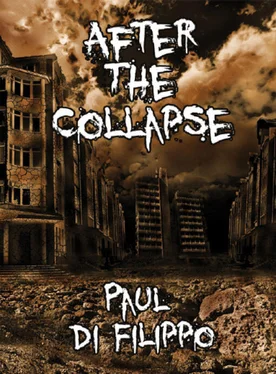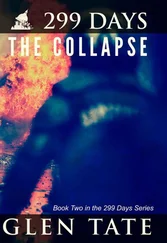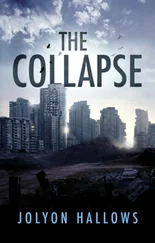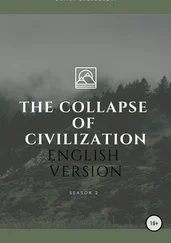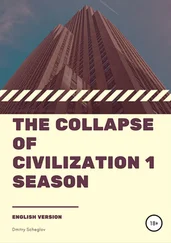Ethan’s sparse possessions remained behind, but the man himself was not there. I reported his absence to Hannah Lawes.
“Please don’t concern yourself unnecessarily, Mr. Hedges. I’m sure Mr. Duplessix will turn up soon. He probably spent the night in intimate circumstances with someone.”
“Ethan? I didn’t realize the camp boasted any female trolls.”
“Now, now, Mr. Hedges, that’s most ungenerous of you.”
Ethan did not surface the next day, or the day after that, and was eventually marked a runaway.
The third week of October brought the dreaded announcement. Lulled by the gentle autumnal weather, the unvarying routines of the camp, and by the lack of any foreshadowings, the citizens of Femaville 29 were completely unprepared for the impact.
A general order to assemble outside by the buses greeted every diner at breakfast. Shortly before noon, a thousand refugees, clad in their donated coats and sweaters and jackets, shuffled their feet on the field that doubled as parking lot, breath pluming in the October chill. The ranks of buses remained as before, save for one unwelcome difference.
The motors of the buses were all idling, drivers behind their steering wheels.
The bureaucrats had assembled on a small raised platform. I saw Hannah Lawes in the front, holding a loud-hailer. Her booming voice assailed us.
“It’s time now for your relocation. You’ve had a fair and lawful amount of time to choose your destination, but have failed to take advantage of this opportunity. Now your government has done so for you. Please board the buses in an orderly fashion. Your possessions will follow later.”
“Where are we going?” someone called out.
Imperious, Hannah Lawes answered, “You’ll find out when you arrive.”
Indignation and confusion bloomed in the crowd. A contradictory babble began to mount heavenward. Hannah Lawes said nothing more immediately. I assumed she was waiting for the chaotic reaction to burn itself out, leaving the refugees sheepishly ready to obey.
But she hadn’t countered on the children intervening.
A massed juvenile shriek brought silence in its wake. There was nothing wrong with the children gathered on the edges of the crowd, as evidenced by their nervous smiles. But their tactic had certainly succeeded in drawing everyone’s attention.
Izzy was up front of her peers, and she shouted now, her young voice proud and confident.
“Follow us! We’ve made a new home for everyone!”
The children turned as one and began trotting away toward Djamala.
For a frozen moment, none of the adults made a move. Then, a man and woman—Vonique’s parents—set out after the children.
Their departure catalyzed a mad general desperate rush, toward a great impossible unknown that could only be better than the certainty offered by FEMA.
Nia had been standing by my side, but she was swept away. I caught a last glimpse of her smiling, shining face as she looked back for a moment over her shoulder. Then the crowd carried her off.
I found myself hesitating. How could I face the inevitable crushing disappointment of the children, myself, and everyone else when their desperate hopes were met by a metropolis of sticks and stones and pebbles? Being there when it happened, seeing all the hurt, crestfallen faces at the instant they were forced to acknowledge defeat, would be sheer torture. Why not just wait here for their predestined return, when we could pretend the mass insanity had never happened, mount the buses and roll off, chastised and broken, to whatever average future was being offered to us?
Hannah Lawes had sidled up to me, loud-hailer held by her side.
“I’m glad to see at least one sensible person here, Mr. Hedges. Congratulations for being a realist.”
Her words, her barely concealed glee and schadenfreude, instantly flipped a switch inside me from off to on, and I sped after my fellow refugees.
Halfway through the encampment, I glanced up to see Djamala looming ahead.
The splendors I had seen in ghostly fashion weeks ago were now magnified and recomplicated across acres of space. A city woven of childish imagination stretched impossibly to the horizon and beyond, its towers and monuments sparkling in the sun.
I left the last tents behind me in time to see the final stragglers entering the streets of Djamala. I heard water splash from fountains, shoes tapping on shale sidewalks, laughter echoing down wide boulevards.
But at the same time, I could see only a memory of myself in a ruined building, gun in hand, confronting a shadow assassin.
Which was reality?
I faltered to a stop.
Djamala vanished in a blink.
And I fell insensible to the ground.
I awoke in the tent that served as the infirmary for Femaville 29. Hannah Lawes was sitting by my bedside.
“Feeling better, Mr. Hedges? You nearly disrupted the exodus.”
“What—what do you mean?”
“Your fellow refugees. They’ve all been bussed to their next station in life.”
I sat up on my cot. “What are you trying to tell me? Didn’t you see the city, Djamala? Didn’t you see it materialize where the children built it? Didn’t you see all the refugees flood in?”
Hannah Lawes’s cocoa skin drained of vitality as she sought to master what were evidently strong emotions in conflict.
“What I saw doesn’t matter, Mr. Hedges. It’s what the government has determined to have happened that matters. And the government has marked all your fellow refugees from Femaville 29 as settled elsewhere in the normal fashion. Case closed. Only you remain behind to be dealt with. Your fate is separate from theirs now. You certainly won’t be seeing any of your temporary neighbors again for some time—if ever.”
I recalled the spires and lakes, the pavilions and theaters of Djamala. I pictured Ethan Duplessix rattling the bars of the Iron Grotto. I was sure he’d reform, and be set free eventually. I pictured Nia and Izzy, swanning about in festive apartments, happy and safe, with Izzy enjoying the fruits of her labors.
And myself the lame child left behind by the Pied Piper.
“No,” I replied, “I don’t suppose I will see them again soon.”
Hannah Lawes smiled at my acceptance of her dictates, but only for a moment, until I spoke again.
“But then, you can never be sure.”
Paul Di Filippo’sfiction has been appearing in print for over thirty years now. He’s aiming to beat Jack Williamson’s career record, but is counting on medical science to help. He lives in Providence, Rhode Island, amidst daily reminders of Lovecraft’s tenure in that town. His mate of nearly forty years is Deborah Newton, and their companions at the moment are Penny Century, a calico cat, and Brownie, a chocolate-colored cocker spaniel.
BORGO PRESS BOOKS BY PAUL DI FILIPPO
After the Collapse: Stories from Greenhouse Earth
Cosmocopia: A Science Fiction Novel
Copyright © 2003, 2006, 2009, 2010, 2011 by Paul Di Filippo
Published by Wildside Press LLC
www.wildsidebooks.com
